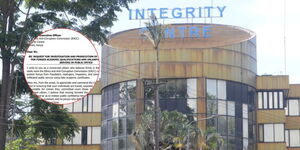In the 1930s, after struggling to make ends meet, Gerald Gikonyo and his friend Gerishon Kirima (now deceased) set their sight on a better life in the city of Nairobi.
The tycoon, who would later come to be known as the landlord of Sabina Joy, Nairobi's most recognised brothel along Moi Avenue, arrived in the city in tattered clothes from his village of Rwathia in Murang'a County ready to hawk his way to success.
When he landed in the city, his first job was to sell cabbage alongside Kirima at Marikiti Market and at some point, hawked them from door to door in the nearby neighbourhoods populated by Indians.
“Selling vegetables was tough because if it was raining, you would have to work in the rain. And you had to rush so that you did not find the families had already cooked," he stated in an interview in April 2021.
He worked diligently to a point where he opened a hotel and at some point, employed former Equity Bank Chairman Peter Munga as a casual labourer in one of their establishments.
While in Nairobi, Gikonyo also worked as a coffee plantation farmer and would later join the Kenya Planters Co-operative Union’s coffee mill. He walked out of formal employment shortly after - never to look back.
His fortunes, however, experienced a serious makeover in 1947, nearly two decades since he set his foot in the city under the sun when he established Mwihoko General and Rwathia Supplies. The company was a partnership between him and five of his friends.
The group put up a hotel and he, with one other colleague, was tasked with running the establishment. Some of the fortunes they realised from the sale were sent back to their elders for safe-keeping.
Towards the end of the 1950s, the largely white settlers began selling buildings in the city and Gikonyo, who had become a bona fide businessman, partnered with investors and bought buildings across the city, including the one housing Sabina Joy.
In 1952, the groups started acquiring entire plots and constructing commercial and residential buildings. The ride was not that easy as shortly after, the Mau Mau soldiers disrupted the economy.
“When we returned, we decided that we would henceforth enter the city centre, where we were not allowed before. Our idea was to rent buildings and start businesses.
“But most of the buildings we wanted to rent were owned by Asians. They were fearful of the Mau Mau, so many of them were migrating from Kenya and selling those buildings. This is how we started buying some of the buildings that we own to date," explained Gikonyo.
Today, the supplies company the Rwathia boys created has ballooned into 50 companies. It is believed that the group own a sprawl of buildings in Nairobi and at some point and employed over 100,000 people.
Gikonyo was so successful that in 2017, President Uhuru Kenyatta and then Governor Evans Kidero handed him a ceremonial key to the city. With that, the tycoon had the opportunity of parking his cars free of charge, attending all county and national governments functions and having a road named after him.
"This is a token of appreciation to honour your work in this county. With this key, you can move freely within Nairobi County. You are also exempted from paying the city-county parking fees for your fleet of vehicles," stated Kidero at the event.
The father of 26 is still going strong at 111 years.












